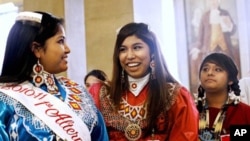The United States has thrown its support behind the United Nations Declaration on the Rights of Indigenous Peoples. The U.N. Declaration on the Rights of Indigenous Peoples, which is a non-binding, aspirational document, addresses many issues of grave concern to indigenous peoples in the United States and around the world.
In remarks at the White House Tribal Nations Conference, President Barack Obama announced U.S. support for the U.N. Declaration on the Rights of Indigenous people, and said, "The aspirations it affirms – including the respect for the institutions and rich cultures of native peoples – are one[s] we must always seek to fulfill." President Obama pointed to the more detailed statement about U.S. support for the Declaration and the administration's work on indigenous issues.
The decision to review the U.S. position on the Declaration came in response to calls from many tribes, individual Native Americans, civil society, and others in the United States who believe that U.S. support for the declaration will make an important contribution to U.S. policy with respect to Native American issues.
The U.S. is home to over 2 million Native Americans, 565 federally recognized Indian tribes, and other indigenous communities. U.S. support for the U.N. declaration reflects the U.S. commitment to work with those tribes, individuals, and communities to address the challenges they face, including poverty, unemployment, environmental degradation, health care gaps, violent crimes, and discrimination.
The United States is committed to serving as a model in the international community in promoting and protecting the collective rights of indigenous peoples as well as the human rights of all individuals. The United States supports the principle that indigenous individuals are entitled without discrimination to all human rights recognized in international law, and that indigenous peoples possess certain additional collective rights.
In concluding his remarks, which addressed numerous other issues of concern to Native Americans, President Obama said that moving forward on indigenous issues is not just a matter of legislation, not just a matter of policy. It's a matter of living up to our core values. It's a matter of upholding an ideal that has always defined who Americans are: E pluribus unum. Out of many one. "I am confident," said President Obama, "that if we keep up our efforts, that if we continue to work together, that we will live up to the simple motto and we will achieve a brighter future for the first Americans and for all Americans."
U.S. Supports Indigenous Rights

The United States has thrown its support behind the United Nations Declaration on the Rights of Indigenous Peoples.

















